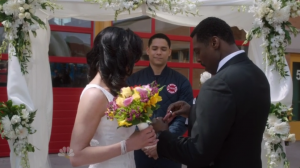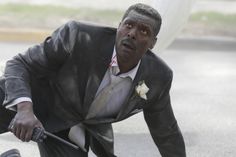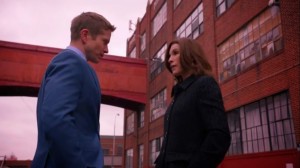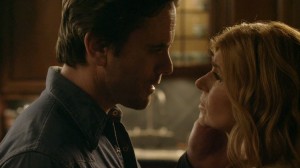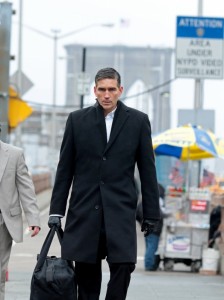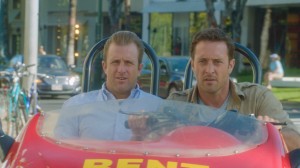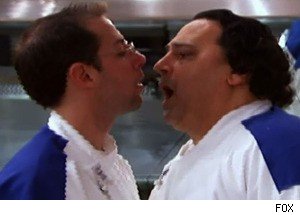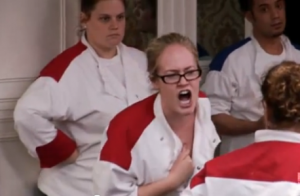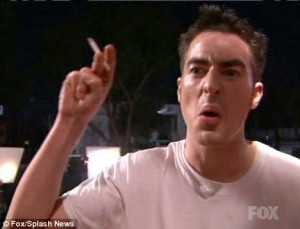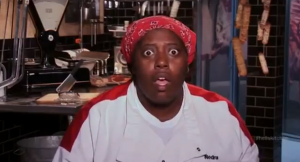Let me catch you up. Last time, we did part one; this time we’re doing part two because counting. Any questions? Good! This second crop of episodes brought their shows’ respect seasons to a close with some expected tropes: engagements, weddings, explosions, interpersonal conflict, the death of modern privacy. You know, typical stuff. But even when these shows leaned heavily on such traditional narrative developments, the best of the bunch still managed to leave us salivating for the fall.
All right, time to dispatch with the generalities and dive right in. Without further adieu, here we go!
Arrow, “Unthinkable”
I’m just going to say it, after the outstanding quality of the two preceding episodes–“City of Blood” and “Streets of Fire”–I went into Arrow‘s second season finale with the kind of enthusiasm reserved only for the most anticipated of television events. Make no mistake about it, “Unthinkable” brought it home in many ways, but can I also admit I felt a tad let down? I know, I know. Shoot me in the face with an exploding arrow because I’m a dumb-dumb. But hear me out!
After upping the ante big time vis-a-vis Moira’s murder at Slade’s hands (sword?) and the general pandemonium in Starling City caused by Blood’s super-soldiers, I wanted even more sh*t to go down. It felt like Arrow was going there, and I wanted the show to tumble even further down the rabbit hole. Unfortunately, it didn’t. Look, it’s probably the right choice to bring closure to the first two seasons with Oliver triumphant and Slade burried deep within an A.R.G.U.S. prison beneath the sand of Lian Yu. But am I the only one who found Oliver’s take-down of Slade far too easy? Not to mention, of course, it took those of us ‘shipping the U.S.S Olicity and ripped our hearts out. What a cruel trick, Oliver, you heart-breaking rapscallion.
Still, I enjoyed the way Arrow went out of its way to set the table for a new chapter both in the present and past narratives. A.R.G.U.S seems poised to take a more prominent role in Starling City’s myriad goings-on, with Amanda Waller at the controls. I dig it. Plus, for the better part of season two’s back-half, the flashbacks on Lian Yu were progressing at a glacial pace, so I loved the reveal of Oliver waking up in Hong Kong and meeting Waller. And at its best, that’s what this finale did so well. It closed the two-season chapter on the show we’ve grown to love: the rise of The Arrow. Now onto bigger and better things, I hope! For instance, more of this, please:
The finale sent off our secondary characters with variable success. Pros: Thea, sick of the lies, aligns with Papa Malcolm and Diggle needs to pick out a crib ’cause he gonna be a daddy! The meh: Quentin succumbs to his injuries and collapses in a bloody heap in Laurel’s arms, and Sara rejoins the League of Assassins as repayment for their clandestine assistance in stopping Slade.
For me, the pros outweighed the cons, and the second season proved itself a vast improvement over the first: more cohesive, more balanced, more confident. So, in that regard, I’m looking forward to season three, but I can’t shake the wish that Arrow had given us just a little something more.
Grade: B+
Chicago Fire, “Real Never Waits”
I’m not going to lie: Chicago Fire played it safe in its finale. It didn’t swing for the fences; instead, it seemed more content to tick off the boxes needed to put a bow on a solid and improved second season. Boden marries (at 51 because duh they’re family) with Mills officiating; Dawson passes her firefighter’s test; Casey proposes to Dawson at Boden’s wedding (Lt. Casey, ye hogger of limelight) but an emergency interrupts her response; a fire at a boarding school shakes Severide to his core, prompting him to buy a junky motorcycle rather than feel his feels; Shay continues to see the ragamuffin thief who ripped her off earlier in the season.
Narratively speaking, none of this would set the world on fire (ha! puns!), but it was serviceable and did its Chicago Fire thing throughout, so good for it. My favorite part of the finale, however, has to be the pairing of Eamonn Walker’s Boden with David Eigenberg’s Hermann. Sure, Eigenberg deserves more than B-plot status as Boden’s best man, but I’ll take whatever the show gives me. Season two made incremental improvements in giving this talented and underrated actor some better material (Lieutenant Hermann!), but I want to see that trend continue into season three.
I’m a sucker for a good cliffhanger, even if said cliffhanger relies on something obvious like a building explosion. But, man! A building exploded with all of 51 inside! The sequence played out with palpable tension, and we knew too much joy and reconciliation amongst the members of the squad would not last long. Hence, boom.
And what a chilling ending to the episode: Boden screaming into his radio for somebody–anybody–to report. REPOOOOOORT!
Grade: B
The Good Wife, “A Weird Year”
If you haven’t been watching The Good Wife this year, then you’re missing out on one of the best seasons of network drama in recent memory. Seriously, throughout its twenty-two episodes, The Good Wife managed to reinvent itself not once but twice. First with Alicia and Carey branching out from Lockhart/Gardner to start their own firm and then with one of the best small screen shockers ever: Will Gardner getting gunned down in a courtroom. Since Will’s death, Alicia has been reeling, and the show used her personal catastrophe to enrich and deepen arguably the best female character on television. Ladies and gentlemen, this is how you prevent a show from stagnating. Holy cow!
What’s even more impressive, next year seems headed on an exciting trajectory sure to give season five a run for its money in terms of quality. Despite concluding a season typified by shake-ups and surprises, this episode dealt mostly with the theme of inevitability. Alicia and Carey, after a seeming blissful start to their partnership, inevitably devolve into acrimonious debate over the issue of merging with Lockhart/Gardner; Zach graduates and inevitably leaves the nest; Finn’s District Attorney campaign inevitably crashes up against the reality of Chicago politics and ends before it began; Jackie inevitably butts in where she doesn’t belong; Diane inevitably leaves the firm she co-created (David Lee and Louis Canning are just the worst…don’t ever change) and asks for a position at Florrick/Agos. Such a wonderful sense of closure to this tumultuous (in the best sense of the word) season. Great stuff.
But then the doozy, the definitive period to end this season’s litany of game changers: Eli, struck by a sudden epiphany, turns to Alicia and asks if she would like to run for District Attorney. Mic drop. Fade to black. Yeah, you thought for a moment that Eli would confess to Alicia about deleting Will’s voicemail back in season two, but no. The ghost of Will Gardner would not face such summary dismissal; he’ll linger for a while longer, of that I have no doubt.
All in all, a fantastic finale to a brilliant season of television that, this deep into its run, had no business being this good. Is it September yet?
Grade: A
Nashville, “On the Other Hand”
At this point, Nashville is what it is: a night time soap that has lofty aspirations it cannot execute. Now, I’ll grant that this finale stands as a marked improvement over last year’s sudsy debacle, but that’s still not saying a hell of a lot.
I admit I am not the target audience, so the show’s “big moments” don’t land with me like Nashville hopes they will. Luke’s arena-staged (and super awkward) proposal to Rayna did not imbue me with giddy delight; likewise, Deacon’s counter-offered proposal later that night did not send me swooning. Sorry, but can we not end each season of this show with a proposal? Hey, wait a tick! You know what’s better than one proposal? Two? Can you sense my rolling eyes?
Scarlett’s character needs some serious revisiting, with her nervous breakdowns lacking pathos and coming across as unintentional comic relief. Gunnar seems to have persuaded her to stick around and not slink back to her po-dunk town (thanks to the gift of song because duh), but I don’t really care. Meanwhile, Teddy’s Teddying all over the place (ugh), Juliette shows up drunk to a sobriety event (stay classy), and Will comes out to his fiancee, unaware that a well-placed camera recorded his confession.
Hear that? It’s the sound of me straining to care.
Like I said, this show is what it is. It’s never going to be my favorite or even something I’ll admit to watching in public, but look: I dig the music, Connie Britton’s the best, and my wife likes it, okay?
Grade: C
Person of Interest, “Deus Ex Machina”
So we’re all in agreement that Person of Interest is now officially the scariest show on television, right? I mean, sheesh, with Samaritan not only up and running but also–if the closing shot of the episode is any indication–beginning to adopt a sentient sense of self, PoI pretty much warns us about the death of privacy in the modern world. And it’s terrifying. Yes, by the end of this fantastic episode, Greer and Decima Technologies emerge as the victors, and the cost is steep: our core group disbands to evade the watchful eye of Samaritan thanks to a bit of handy work from Root that essentially creates identity blind spots. Quick question: um, what’s the deal with Fusco? He should totally get out of Dodge, too, right? Fusco?
Person of Interest fully embraced the dark realities of surveilling citizens this year, turning in its strongest run of episodes yet. Season three will prove difficult to top, but I’m thrilled for the next chapter. One small point of contention: apparently, Peter Collier, the Vigilance leader/kangeroo court baddie, found himself at the wrong end of Greer’s long con. That Greer created Vigilance as a tangible threat to national security in order for him to prove the worth of Samaritan to the US government is one of those classic villain plots that makes no sense when given a millisecond of scrutiny; come on, Person of Interest, you’re better than that! Then again, I suppose we don’t have to bemoan this fact too much because Greer fired Collier very aggressively. Namely, he shot him.
Still, what a brilliant and frightening hour of television! Highlights of the episode included the intense trial (um, Control rocked my world) and the genius pairing of Reese and Hirsch kicking ass and taking names. Talk about a match made in heaven! Speaking of which, RIP Hirsch, you loony ‘toon you!
I absolutely cannot wait for the fourth season of this fantastic show because this finale left me with so questions swirling around my brain. How will our fateful heroes find each another again? How far will Person of Interest take this terrifying vision of government surveillance run amok? And, most important, how’s Bear?
Until the fall! And remember: Samaritan’s watching…
Grade: A
Thanks for reading, TV fanatics! Look for the third and final season finale report card next week!


